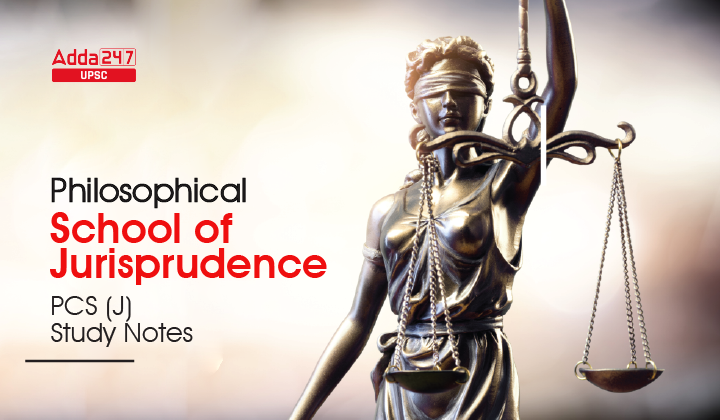Table of Contents
Philosophical School of Jurisprudence
The Latin word jurisprudentia, from which we get the English word “jurisprudence,” meaning “knowledge of law.” As such, jurisprudence denotes familiarity with the law and its application and encompasses the full range of international legal ideas.
It’s common knowledge that there are essentially five distinct schools of jurisprudence
- Philosophical school or Natural law.
- Analytical School
- Historical School
- Sociological School
- Realist School.
The famous Jurists of the Philosophical School, the Moral School, or the Natural Law of Jurisprudence advocated the origins of law as God, Nature, or Reason, hence this school goes by a number of different titles. This school of thought holds that the law is intrinsically good for everyone, regardless of where they come from, and that it can be deduced logically and rationally from human decency. In a word, the goal of this school is to investigate law from the perspective of what it hopes to become and achieve: something moral, logical, and just.
Advocates of Philosophical school of Jurisprudence
Hobbes on Philosophical school of Jurisprudence
The social contractual hypothesis of positivist law was first proposed by Thomas Hobbes. He asserted that while all men might disagree on whether or not they should find joy, they could come to an all-encompassing understanding of the things they feared (savage demise on account of another, and loss of freedom and individual property). A healthy individual who values survival and success would operate in accordance with natural law, according to this definition.
Hugo Grotius on Philosophical school of Jurisprudence
Numerous consider this Dutch native and Republican philosopher to be the “founding father” of international law for his many significant contributions to the field. He was the first to separate law from religion, paving the way for the establishment of a secularised, modern form of natural law. In his view, the issue is less about God and more about lawyers and philosophers because natural rules are self-evident and need no divine backing.
John Locke on Philosophical school of Jurisprudence
John Locke supported state sovereignty at whatever cost, dismissing the value of the individual in favour of the collective. Having lived through the events of the Glorious Revolution in 1688, he revised Hobbes’s conception of the social compact to exclude a preexisting social order. Locke argued that, contrary to Hobbes, life in the wild was lovely and enjoyable, save for the insecurity of private property. To ensure the safety of his possessions, man has entered into a social compact, waiving some of his rights rather than all of them as Hobbes proposed. His rights to life, liberty, and the pursuit of happiness were not taken away by this concession; rather, he gave up simply the power to keep the peace and execute nature’s laws. State and law existed to “defend the natural right” of an individual.
Rousseau on Philosophical school of Jurisprudence
Since man lived in harmony with the natural world and was free to pursue his own interests, Rousseau viewed this condition as a utopian ideal. But as the population grew, so did the fear of scarcity, and with it, the friction between an individual’s desires and the collective’s. To resolve this tension, Rousseau argues, humans have traditionally banded together to form communities, at which point they voluntarily cede their natural rights to the State in exchange for the security of those rights and the opportunity to conform their behaviour to the “public will.”
Rudolf Stammler on Philosophical school of Jurisprudence
“Species of will, other-looking, self-authoritative, and inviolate” is how Stammler characterised the law. He believed that a just rule protecting individual freedom was the best manifestation of man’s social existence. He argued that the two most fundamental elements for fair legislation were the value of respect and the principle of community engagement. He thinks that “just law,” which brings social goals into harmony, is implied by “the law of nature.” Law’s purpose is not to protect individual desires but to harmonise societal goals.
न्यायशास्त्र के दार्शनिक स्कूल
लैटिन शब्द न्यायशास्त्र, जिससे हमें अंग्रेजी शब्द “न्यायशास्त्र” मिलता है, जिसका अर्थ है “कानून का ज्ञान।” जैसे, न्यायशास्त्र कानून और उसके आवेदन के साथ परिचितता को दर्शाता है और अंतरराष्ट्रीय कानूनी विचारों की पूरी श्रृंखला को शामिल करता है।
यह सामान्य ज्ञान है कि न्यायशास्त्र के अनिवार्य रूप से पांच अलग-अलग स्कूल हैं
- दार्शनिक स्कूल या प्राकृतिक कानून।
- विश्लेषणात्मक स्कूल
- ऐतिहासिक स्कूल
- समाजशास्त्रीय विद्यालय
- यथार्थवादी स्कूल।
दार्शनिक स्कूल, नैतिक स्कूल, या न्यायशास्त्र के प्राकृतिक कानून के प्रसिद्ध न्यायविदों ने भगवान, प्रकृति या कारण के रूप में कानून की उत्पत्ति की वकालत की, इसलिए यह स्कूल कई अलग-अलग खिताबों से जाता है। विचार के इस स्कूल का मानना है कि कानून सभी के लिए आंतरिक रूप से अच्छा है, चाहे वे कहीं से भी आए हों, और इसे मानवीय शालीनता से तार्किक और तर्कसंगत रूप से निकाला जा सकता है। एक शब्द में, इस स्कूल का लक्ष्य कानून की जांच इस परिप्रेक्ष्य से करना है कि वह क्या बनने और हासिल करने की उम्मीद करता है: कुछ नैतिक, तार्किक और न्यायपूर्ण।
न्यायशास्त्र के दार्शनिक स्कूल के अधिवक्ता
हॉब्स ऑन फिलॉसॉफिकल स्कूल ऑफ ज्यूरिस्प्रुडेंस
प्रत्यक्षवादी कानून की सामाजिक संविदात्मक परिकल्पना सबसे पहले थॉमस हॉब्स द्वारा प्रस्तावित की गई थी। उन्होंने जोर देकर कहा कि जबकि सभी पुरुष इस बात से असहमत हो सकते हैं कि उन्हें आनंद मिलना चाहिए या नहीं, वे उन चीजों की एक व्यापक समझ में आ सकते हैं जिनसे वे डरते थे (दूसरे के कारण बर्बर मृत्यु, और स्वतंत्रता और व्यक्तिगत संपत्ति का नुकसान)। एक स्वस्थ व्यक्ति जो अस्तित्व और सफलता को महत्व देता है, इस परिभाषा के अनुसार प्राकृतिक कानून के अनुसार काम करेगा।
न्यायशास्त्र के दार्शनिक स्कूल पर ह्यूगो ग्रोटियस
कई लोग इस डच मूल के और रिपब्लिकन दार्शनिक को इस क्षेत्र में उनके कई महत्वपूर्ण योगदानों के लिए अंतरराष्ट्रीय कानून के “संस्थापक पिता” मानते हैं। वह धर्म से कानून को अलग करने वाले पहले व्यक्ति थे, जिन्होंने प्राकृतिक कानून के एक धर्मनिरपेक्ष, आधुनिक रूप की स्थापना का मार्ग प्रशस्त किया। उनके विचार में, मुद्दा भगवान के बारे में कम और वकीलों और दार्शनिकों के बारे में अधिक है क्योंकि प्राकृतिक नियम स्वयं स्पष्ट हैं और उन्हें किसी दैवीय समर्थन की आवश्यकता नहीं है।
न्यायशास्त्र के दार्शनिक स्कूल पर जॉन लोके
जॉन लोके ने सामूहिक के पक्ष में व्यक्ति के मूल्य को खारिज करते हुए, किसी भी कीमत पर राज्य की संप्रभुता का समर्थन किया। 1688 में शानदार क्रांति की घटनाओं के माध्यम से रहने के बाद, उन्होंने हॉब्स की सामाजिक कॉम्पैक्ट की अवधारणा को संशोधित किया ताकि पहले से मौजूद सामाजिक व्यवस्था को बाहर कर दिया जा सके। लॉक ने तर्क दिया कि, हॉब्स के विपरीत, निजी संपत्ति की असुरक्षा को छोड़कर, जंगल में जीवन प्यारा और आनंददायक था। अपनी संपत्ति की सुरक्षा सुनिश्चित करने के लिए, मनुष्य ने एक सामाजिक समझौते में प्रवेश किया है, जिसमें हॉब्स ने प्रस्तावित सभी अधिकारों के बजाय अपने कुछ अधिकारों को छोड़ दिया है। इस रियायत से उनके जीवन, स्वतंत्रता और खुशी की खोज के अधिकार छीन नहीं गए थे; बल्कि, उन्होंने शांति बनाए रखने और प्रकृति के नियमों को लागू करने की शक्ति को छोड़ दिया। किसी व्यक्ति के “प्राकृतिक अधिकार की रक्षा” करने के लिए राज्य और कानून मौजूद थे।
न्यायशास्त्र के दार्शनिक स्कूल पर रूसो
चूंकि मनुष्य प्राकृतिक दुनिया के साथ सद्भाव में रहता था और अपने हितों को आगे बढ़ाने के लिए स्वतंत्र था, रूसो ने इस स्थिति को एक आदर्शवादी आदर्श के रूप में देखा। लेकिन जैसे-जैसे जनसंख्या बढ़ती गई, वैसे-वैसे बिखराव का डर भी बढ़ता गया, और इसके साथ ही व्यक्ति की इच्छाओं और सामूहिकता के बीच घर्षण भी होता गया। इस तनाव को हल करने के लिए, रूसो का तर्क है, मनुष्यों ने पारंपरिक रूप से समुदायों को बनाने के लिए एक साथ बंधी हुई है, जिस बिंदु पर वे स्वेच्छा से उन अधिकारों की सुरक्षा के बदले राज्य को अपने प्राकृतिक अधिकारों को सौंपते हैं और अपने व्यवहार को “सार्वजनिक इच्छा” के अनुरूप करने का अवसर देते हैं। ”
रूडोल्फ स्टैमलर न्यायशास्त्र के दार्शनिक स्कूल पर
“इच्छा की प्रजातियां, अन्य दिखने वाली, आत्म-आधिकारिक, और उल्लंघन” स्टैमलर ने कानून की विशेषता कैसे की है। उनका मानना था कि व्यक्तिगत स्वतंत्रता की रक्षा करने वाला एक न्यायसंगत नियम मनुष्य के सामाजिक अस्तित्व की सर्वोत्तम अभिव्यक्ति है। उन्होंने तर्क दिया कि निष्पक्ष कानून के लिए दो सबसे मौलिक तत्व सम्मान का मूल्य और सामुदायिक जुड़ाव का सिद्धांत थे। वह सोचता है कि “न्यायसंगत कानून”, जो सामाजिक लक्ष्यों को सद्भाव में लाता है, “प्रकृति के नियम” द्वारा निहित है। कानून का उद्देश्य व्यक्तिगत इच्छाओं की रक्षा करना नहीं बल्कि सामाजिक लक्ष्यों में सामंजस्य स्थापित करना है।
FAQS Philosophical School of Jurisprudence
- What is Philosophical School of Jurisprudence?
Ans: This school of thought holds that the law is intrinsically good for everyone, regardless of where they come from, and that it can be deduced logically and rationally from human decency.
2. How many schools of jurisprudence have been propounded?
Ans: It’s common knowledge that there are essentially five distinct schools of jurisprudence
- Philosophical school or Natural law.
- Analytical School
- Historical School
- Sociological School
- Realist School.




 TSPSC Group 1 Question Paper 2024, Downl...
TSPSC Group 1 Question Paper 2024, Downl...
 TSPSC Group 1 Answer key 2024 Out, Downl...
TSPSC Group 1 Answer key 2024 Out, Downl...
 UPSC Prelims 2024 Question Paper, Downlo...
UPSC Prelims 2024 Question Paper, Downlo...





